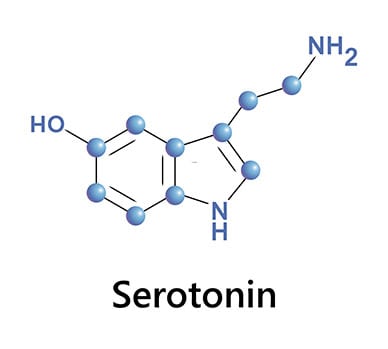Many people are familiar with the neurotransmitter serotonin. Drugs controlling serotonin levels, such as SSRIs, have been used to treat diverse diseases from clinical depression to chronic pain disorders. The link between low serotonin levels and clinical depression has long been known, but new evidence suggests that serotonin also plays a role in gastrointestinal motility and a variety of other important physiological functions. Because 5-HTP and serotonin are intricately related, as 5-HTP is an important part of the process of serotonin synthesis in the human body, 5-HTP may be helpful in treating symptoms caused by serotonin deficiency.
The Role of Serotonin
Serotonin plays a variety of roles in the bodies of humans and other animals. It is an integral neurotransmitter involved in the processes underlying mood, pain relief, sleep and digestion. Serotonin’s role in digestion appears to be especially important, with over 90 percent of serotonin receptors located in the GI tract. This simple molecule plays an important part in sustaining the human body both emotionally and physically.
Because serotonin is so important, a serotonin deficiency can have a variety of negative health effects, including depression, low self-esteem, insomnia, panic attacks, chronic pain disorders and irritable bowel syndrome. There are many health conditions associated with serotonin deficiency, but pharmaceuticals such as SSRIs are not always a viable or effective solution.
Serotonin Synthesis
 5-HTP and serotonin are linked by a process called serotonin synthesis. Serotonin is made in the human body from the amino acid tryptophan. 5-HTP is the last intermediate in this process before the molecule is completely converted to serotonin. Because of its role as a serotonin precursor, levels of 5-HTP and serotonin are directly linked.
5-HTP and serotonin are linked by a process called serotonin synthesis. Serotonin is made in the human body from the amino acid tryptophan. 5-HTP is the last intermediate in this process before the molecule is completely converted to serotonin. Because of its role as a serotonin precursor, levels of 5-HTP and serotonin are directly linked.
Serotonin deficiencies can be due to a lack of precursors, or it can be due to a shortage of the enzymes needed to perform the many biochemical processes involved in creating serotonin. They can also be caused by an imbalance of intestinal flora because these microbes synthesize serotonin as well. The end results of a deficiency vary, but all can have serious effects on quality of life. While doctors have traditionally prescribed drugs preventing serotonin re-uptake to treat certain disorders that involve serotonin deficiency, these drugs don’t address the root issue of having less overall amounts of this key neurotransmitter.
5-HTP and Serotonin Deficiency
Many researchers are finding that supplementing with 5-HTP can help allay the symptoms of serotonin deficiency. Because 5-HTP and serotonin are only separated by one biochemical reaction, taking 5-HTP can produce a noticeable difference in serum serotonin levels. Supplementing with 5-HTP also removes the body’s need to perform all of the chemical reactions needed to turn tryptophan into 5-HTP and then serotonin.
5-HTP has been found in several research trials to be helpful for conditions as diverse as depression, fibromyalgia, headaches, attention deficit disorder and irritable bowel syndrome. How does 5-HTP affect serotonin levels? Not only can 5-HTP be turned into serotonin when the body needs it, but it also can activate certain serotonin receptors to produce the same effects.
Applications of 5-HTP in Modern Health Care
The effects of 5-HTP are still being researched, but it appears to show a great deal of promise as a possible option for certain conditions involving serotonin deficiency. SSRIs and other pharmaceuticals can have unwanted side effects and even cause an excess of serotonin, leading to the deadly serotonin syndrome. Many people are looking for a pure, natural way to safely maintain a healthy mood and alleviate other symptoms of serotonin deficiency.
Serotonin is essential to leading a happy and healthy life in a multitude of ways. 5-HTP may contribute to healthy serotonin balance and to good mental and physical health in a variety of ways. While it is important to talk to your doctor about any supplements, 5-HTP may be the answer to many diseases caused by serotonin deficiency.


